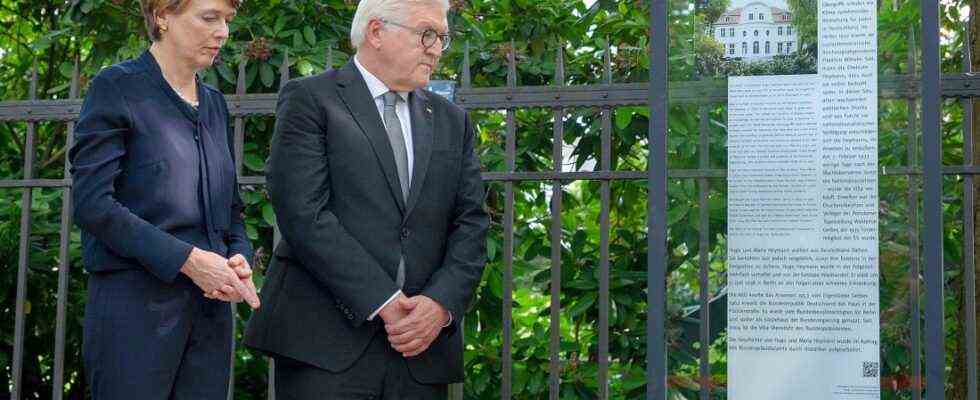Frank-Walter Steinmeier had his own front door sweep when he took office in 2017. Since then, a memorial plaque has been placed in front of the Federal President’s residence on Pücklerstrasse in Berlin-Dahlem, “Everyone who visits us pauses and reads,” Steinmeier said on Monday. Here people learn the story of Hugo Heymann, a manufacturer of artificial pearls who acquired the property known as “Villa Wurmbach” in 1926. After the Nazis came to power, he sold it at a “remarkably low price,” as one historian wrote. In 1938, Heymann succumbed to injuries inflicted by the Gestapo.
According to Steinmeier, the example shows that stories of victims of Nazi crimes, stories of destroyed lives, can literally be found behind almost every facade. But they haven’t all been told for a long time – in the case of the Federal Presidents’ service villa, critical historians were first needed to draw attention to the case. In order to sweep not only at the door of his residence but also at the institution of the Federal President himself, Steinmeier initiated a research project last year and invited critical historians himself. The contemporary historian Norbert Frei, who teaches in Jena and won the tender for the study “The Office of the Federal President and the Confrontation with National Socialism 1949-1994”, shines behind the facades of the official seats of his predecessors.
The observation is not yet finished, but on Monday Steinmeier and Frei met at Bellevue Palace. They presented a kind of progress report – perhaps also to anchor Steinmeier in the public consciousness again as the initiator of the reappraisal, in the event that it is not he, but a successor, depending on the voting behavior of the next Federal Assembly, who will present the finished study in 2022. Steinmeier pointed out that although many institutions in the republic had already had their own past investigated, “there are still no studies on the highest constitutional organs”. And while Richard von Weizsäcker, one of his predecessors in office, emphasized liberation from outside in his much-noticed speech in 1985, when he called the day of the end of the war on May 8th a “day of liberation”, he now wants “internal liberation” “go one step further to work up.
The historian and SZ columnist Norbert Frei presented his research project “The Office of the Federal President and the Confrontation with National Socialism 1949-1994” at Bellevue Palace.
(Photo: Bernd von Jutrczenka / dpa)
Steinmeier praised the historian Frei as “connoisseur of the careers of Nazi elites in the Federal Republic” – and of course the question of employees with a Nazi past in the office of head of state will make up a large part of the research work. In his presentation, Frei mainly dealt with the personnel of Manfred Klaiber, who was the first head of the Federal President’s Office to set up the apparatus for Theodor Heuss – and whose personnel “should result in Heuss needing a lot of public explanation over the next few years”. Klaiber was a member of the NSDAP, like a third of all employees of the Federal President’s Office who were active during the period under review and who were born before 1929. From the Foreign Office, in which he had made a career under National Socialism, he brought former colleagues to the Godesberg Viktorshöhe, where Heuss worked at the time. The fact that Norbert Frei has already investigated the Nazi history of the Foreign Ministry will therefore in no way be a hindrance to his current research.
In 1952, Theodor Heuss destroyed a protective claim that was dear to many
In addition to the question of “who” – which also includes the subject of medals being awarded to citizens with a brown history and pardons – Norbert Frei and his team will above all investigate the question of “how”: In what way do the Federal Presidents have them Did you talk about crimes of the Nazi era and put their past to the test of the Germans? Theodor Heuss, for example, visited the former Bergen-Belsen concentration camp in 1952 and in his speech destroyed a protective claim that was very dear to many at the time: “We knew about things,” said Heuss. But he did not like to speak of collective guilt, rather of “collective shame”.
As in other institutions, he does not expect a continuous path out of the dark into the light, said Frei – periods of increased preoccupation with one’s own past have been followed by phases of relative disinterest, as in the general public debate. Nevertheless, with regard to the Federal Presidents, he wanted to ask himself whether they were “moderator or avant-garde” when it came to coming to terms with things. In which category the incumbent wants to be remembered, Frei did not have to emphasize.

